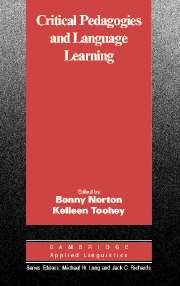Book contents
- Frontmatter
- Contents
- List of contributors
- Acknowledgments
- Chapter 1 Critical pedagogies and language learning: An introduction
- I RECONCEPTUALIZING SECOND LANGUAGE EDUCATION
- II CHALLENGING IDENTITIES
- III RESEARCHING CRITICAL PRACTICES
- IV EDUCATING TEACHERS FOR CHANGE
- Chapter 14 Introducing a critical pedagogical curriculum: A feminist reflexive account
- Chapter 15 Negotiating expertise in an action research community
- Chapter 16 Performed ethnography for critical language teacher education
- Chapter 17 Critical moments in a TESOL praxicum
- Author Index
- Subject Index
Chapter 14 - Introducing a critical pedagogical curriculum: A feminist reflexive account
Published online by Cambridge University Press: 05 October 2012
- Frontmatter
- Contents
- List of contributors
- Acknowledgments
- Chapter 1 Critical pedagogies and language learning: An introduction
- I RECONCEPTUALIZING SECOND LANGUAGE EDUCATION
- II CHALLENGING IDENTITIES
- III RESEARCHING CRITICAL PRACTICES
- IV EDUCATING TEACHERS FOR CHANGE
- Chapter 14 Introducing a critical pedagogical curriculum: A feminist reflexive account
- Chapter 15 Negotiating expertise in an action research community
- Chapter 16 Performed ethnography for critical language teacher education
- Chapter 17 Critical moments in a TESOL praxicum
- Author Index
- Subject Index
Summary
Introduction
The body of this chapter is divided into three main parts. In the first part, I describe a teacher-educator's (my own) attempt to develop a Master of Arts in Teaching English as a Second Language (MATESL) course with the aim to introduce critical pedagogical practices to a group of in-service primary and secondary school English teachers in Hong Kong. In the second part, I look back at the course and at what seems to have transpired during the course and reflexively analyze and discuss the difficulties and frustrations as well as some instances of success experienced. In the third part, I discuss some inherent contradictions of critical pedagogy as delineated in the poststructuralist feminist literature and echoed in my own experience and explore future possibilities and ways of doing critical pedagogies without assuming universal, foundational subject positions.
Part I
Naming and introducing critical courses into an MATESL program: Sites of negotiation and strategic compromise
Like most MATESL programs elsewhere, the existing structure of the MATESL program at the City University of Hong Kong does not have critical pedagogy explicitly laid out as one of its aims or core components. Last year, however, a few colleagues started to propose and build critical elements into a Year 1 core course. In program committee meetings, colleagues debated the name of the course and decided to give it a broader, more general name - Understanding Classroom Practices - although it was understood that the course would also have as one of its aims the raising of students' critical consciousness about antiracist, -sexist, and -classist issues in teaching of English to speakers of other languages.
- Type
- Chapter
- Information
- Critical Pedagogies and Language Learning , pp. 271 - 290Publisher: Cambridge University PressPrint publication year: 2004
- 31
- Cited by



